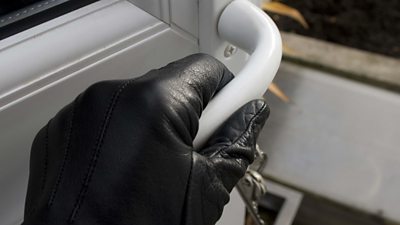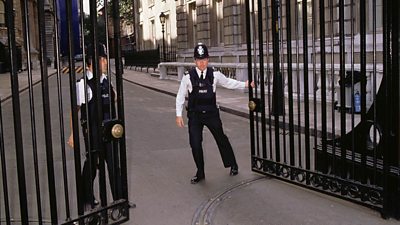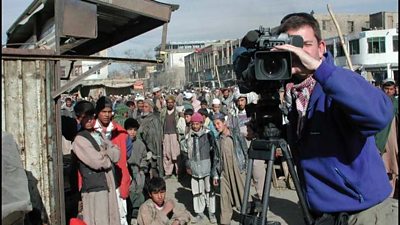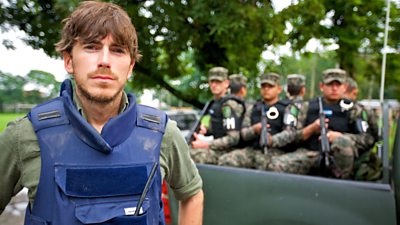This activity can present a significant safety risk, especially if the subject is contentious and/or the target interviewee confrontational. It may provoke an aggressive or even a violent response, not only from the target but also from their family, friends and colleagues. The target may try to avoid being interviewed by either taking refuge or escaping on foot or by vehicle, which may create a collateral damage risk.
Also, tensions can be heightened if there is a media scrum to be first to get an interview.
What Can Go Wrong?
- Physical attack to crew aiming to injure persons or damage camera equipment.
- Injury from weapons (firearms. knives), projectiles (bricks), clubs, high pressure hose pipes etc.
- Injury from animals such as dogs, horses etc.
- Injury from vehicles caused by erratic and/or fast driving.
- Injuries from entanglement with other crews or others at the location.
- Getting cornered or unable to escape from threatening situations.
- Verbal threats or abuse.
Legal/91�ȱ� Requirements
- Adhere to 91�ȱ� Editorial guidelines including where practicable trying to secure an interview first via normal routes to avoid confrontation.
- All door step activities must have prior sign off from a senior manager.
- This guide provides important background and information to inform your planning, assessment and arrangements. Reading it does not make you an expert, nor preclude the need for separate risk assessment. If you require any additional information or clarification you should always contact the Safety Advice Line or High Risk team, as appropriate.
Control Measures
Planning Controls
- Obtain as much information about the target, especially before a potentially confrontational doorstep.
- Identify anyone else who may be present and assess the likely threat that they might present.
- Consider local security issues, including general crime levels.
- Consider attitude and potential hostility towards journalists, the media and particularly the 91�ȱ�.
- If possible Recce the area of the doorstep in advance.
- Ideally only conduct doorsteps at a location with good exit routes.
- Plan where to park and position vehicles so that there are clear exit routes from the location as well as ensuring that the team has a safe route back to them.
- Consider alternative withdrawal options if vehicles are blocked in or damaged.
- Have an emergency plan which covers how to escape and potential fall-back positions.
- Know in advance whether you intend to pursue the target should they choose to travel by vehicle (this is usually not a good option.)
- Check mobile phone coverage and consider taking back-up communication systems (e.g. walkie talkie or personal alarm system.)
- Evaluate the need to take, and/or wear, Personal Protective Equipment (e.g. stab vests, bump hats.)
- Consider what other items may (legally) be taken for protection against dangerous dogs.
- Assess the requirement for additional persons, either an increased team size or specialist back up support.
On Site Controls
- Keep a low profile. Avoid attracting unwarranted attention.
- Do not carry unnecessary equipment, bags, laptops etc. which could hinder movement.
- Display 91�ȱ� logo unless it may be contentious (e.g. if it raises personal risk.)
- Ensure the team is briefed and fully understand all aspects of the plan and contingencies.
- Plan and agree with the team a safe location(s) as a fall-back position.
- Check communications work, and ensure all numbers are logged in phone for speed dial.
- Place one person in charge of the crew's safety and give them the authority to override the ground crew if the situation becomes dangerous. Encourage a culture on site that staff can bring up any safety concerns that they have without reprisal.
- Position the team where an initial physical reaction will not harm them - out of the way of weapons, projectiles, fists etc.
- Ensure there is an unobstructed route away from an adverse reaction. Be aware of stairs, kerbs, and other trip hazards. Consider need for backwatchers (see Useful Documents)
- Do not stand directly in front of doors or block exit, rather stand near brickwork. Not only is this hard protection but also may be less confrontational for the interviewee.
- Do not use your body to keep a door open; ensure hands and feet are away from open door frames.
- Try not to ‘corner’ the target as they may be violence trying to escape.
- Camera and lights are intimidating and may provoke an attack, so keep the team well back so that they do not incite a violent reaction.
- The interviewer will need to work quickly to defuse an initial adverse reaction by providing space, keeping calm, speaking slowly, clearly and asking questions and listening to the answers. Badgering an interviewee may provoke a violent reaction.
- Record any PTC away from the property, so that you are not surprised by a subsequent attack.
- Abandon recording/ filming if the situation deteriorates.
- If you identify a threat from a firearm or shotgun then immediately withdraw and call the police.
Keep Deployers/Line Managers/Editors up to date with the situation and any changes to security and safety so that changes to the story can be made if needed.
Division Specific Issues
News
- Any proposal to doorstep, whether in person or on the phone, where we have tried to make an appointment for an interview with the individual or organisation concerned, must be approved by a senior editorial figure or, for independents, by the commissioning editor.
- When public figures and other people are in the news, they can expect to be the subject of media attention. We may ask questions and record their answers for broadcast, without prior arrangement, as they come and go from buildings, airports and so on. However, we should be aware that when media representatives congregate in large numbers to cover a news story, the resulting media scrum can become intimidating or unreasonably intrusive. Sometimes, it will be appropriate to make pooling arrangements with other media organisations. At other times, we may judge it proper to withdraw.
FAQs/Did You Know?
- Besides possible threat from the target, other risks should be taken into consideration such as: working at night/during dark hours, the crime rate in the doorstep location, potential community anger either against the target or the 91�ȱ� Team.
Useful documents
Recommended links
Personal security topics
-

Security (Personal)
Measures you can take to help protect yourself -

Security (on Location)
Advice for maintaining security on productions -

Covert Filming
A guide to a genre of programmes which involve investigative journalism, surreptitious and covert filming or recording, creating potential personal security risks. -

Courts of Law
A guide to working in, outside or, around courts following a news story. -

Demonstrations, Protests, and Crowds
91�ȱ� Safety has a whole host of safety guidance to assist teams when they are planning a deployment to a demonstration or protest. -

Door-Stepping
The risks of obtaining an interview, or piece to camera, from a contributor without prior arrangement or agreement. -

Harassment and Stalking
Guideline to harassment and stalking, including internet / social media trolling. -

Lone Working
This Guideline sets out the hazards and precautions to be considered when lone working, whether it is in the office, on location or overseas. -

Security on Location
Guideline provides measures to help mitigate the security threats associated with production activities on location, including door-stepping, covert filming, working with crowds and public order issues. -

Violence and aggression
Guidance on dealing with violence and aggression
More from SSR
-
Your platform to record accidents, risk assessments, assurance monitoring and inspections
-
Safety Equipment Stores
Just one number to call: 0844 800 8875 -
91�ȱ� Safety Guidelines
An A-Z of 91�ȱ�'s Health and Safety Guidelines -
Safety Advice Line: 0370 411 0464 Email: safety@bbc.co.uk
Events guidance - key links:
- Exhibitions
- General Guidance
- Indoor Location Recce Checklist
- Outdoor Location Recce Checklist
- Major Incidents & Emergency Planning
- Marketing and Promotional
- Noise Exposure
- Planning and Management
- Responsibilities
- Responsibilities Form
- Laser Lighting Effects
- Strobe Lighting
- Temporary Stages and Rostra
Health topics - key links:
- (91�ȱ� network only)
- Contributors Fitness to Participate
- Display Screen Equipment (DSE)
- (91�ȱ� network only)
- First Aid and Welfare on Location
- International Travel - Risks & Health
- Manual Handling
- Mental Health: 91�ȱ�page
- (91�ȱ� network only)
- Personal Health and Wellbeing
- Pregnancy
- Psychological Trauma Support & Trauma Risk Management (TRiM)
- Tiredness and Fatigue
- Travel Health Contacts
91�ȱ� High Risk - key links:
- CBRN and Industrial Spills
- Covert Filming
- Crisis Management and Security Support
- Demonstrations, Protests and Crowds
- Disaster Coverage
- Door Stepping
- (91�ȱ� network only)
- (91�ȱ� network only)
- Public Order
- Safety Equipment Stores
91�ȱ� Journalism - key links:
91�ȱ� Productions - key links:
- Aerial Filming and Airfields
- Animals: Displaying and handling for performance
- Boats: Working on
- Children and Young People
- Driving
- Electrical Equipment and Systems
- First Aid and Welfare on Location
- Food Safety (Cooking and Catering)
- Remote Location Working
- Roads and Streets: Working by
- Security of Productions on Location
- Stunts
- Tiredness and Fatigue
- Unmanned Aerial Systems (UAS aka Drones)
- Vehicles: Recording in, from and around
- Working at Height: Mobile Elevating Work Platforms
- Working at Height: Tower Scaffolds
91�ȱ� Radio - key links:
- (91�ȱ� Network only)
91�ȱ� Security - key links:
91�ȱ� Sport - key links:
About this site
This site describes what the 91�ȱ� does in relation to managing its health, safety and security risks and is intended for those who work directly for the 91�ȱ�.
It is not intended to provide instruction or guidance on how third parties should manage their risks. The 91�ȱ� cannot be held liable for how this information is interpreted or used by third parties, nor provide any assurance that adopting it would provide any measure of legal compliance. More information
Some links on this site are only accessible when connected to the 91�ȱ� network
